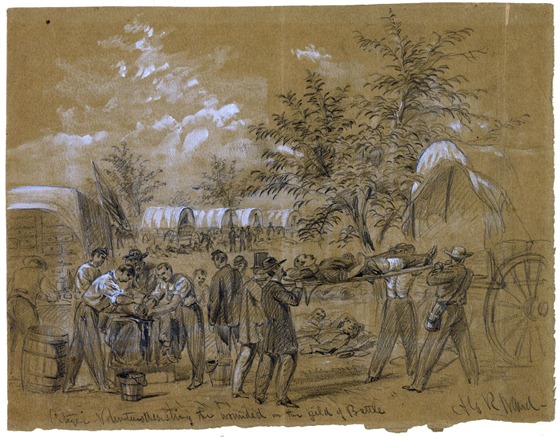September.—Edgar A. Griswold of Naples is recruiting a company here for the 148th Regiment, of which he is captain. Hiram P. Brown, Henry S. Murray and Charles H. Paddock are officers in the company. Dr Elnathan W. Simmons is surgeon.
Tuesday, September 18, 2012
September 17, 1862 at Antietam.
1 drawing on olive paper : pencil and Chinese white.
Signed lower right: Alf R Waud.
Library of Congress image.
Title inscribed below image.
September 18—Nothing new, only plenty of bad weather and hard work. We received marching orders at 9 A.M. We arrived in Petersburg at 5 P.M. Saw several friends there. Left Petersburg at 8 o’clock that night in cars for Wakefield. Arrived there at 11 A.M.
SEPTEMBER 18th.—To-day, in response to the President’s proclamation, we give thanks to Almighty God for the victories HE has blessed us with.
Thursday, Sept. 18, 1862. (Thanksgiving Day.)—We staid three days at the Washington Hotel; then a friend of H.’s called and told him to come to his house till he could find a home. Boarding-houses have all been broken up, and the army has occupied the few houses that were for rent. To-day H. secured a vacant room for two weeks in the only boarding-house.
![]()
______
Note: To protect Mrs. Miller’s job as a teacher in New Orleans, the diary was published anonymously, edited by G. W. Cable, names were changed and initials were often used instead of full names — and even the initials differed from the real person’s initials.[September 18th]
At break of day all fell in, expecting a renewal of the battle, but no movement was ordered and the men walked about trying to pull themselves together.
In the rear of our lines the officers moved about in comparative safety, but any attempt to cross the sunken road on the right intersecting our line at a right angle was almost always fatal. I crossed twice, however, without being hit, having to take orders to the Fifty-second, which lay on the other side of the road. No change in our position occurred during either the day or following night, and we shivered again without other protection than a pretty thin blanket.
September 18.—The whale ship Elisha Dunbar of New-Bedford, Mass., was captured and burned by the confederate privateer Alabama, in latitude 30° 50′, and longitude 35° 20′.
—Charles S. Olden, Governor of New-Jersey, issued a proclamation to the people of that State, setting forth the condition of the country and calling upon the young men to enroll themselves in the uniformed companies, and perfect themselves in drill, in order that they might defend their homes in case the State should be invaded.
— The bridge on the Hatchie River, four miles north of Memphis, Tenn., was burned by a party of rebel guerrillas.—The rebels evacuated Harper’s Ferry, Va.
— The rebel General Bragg, issued a proclamation from his headquarters at Glasgow, Ky., informing the people of that State that he had come with the confederate army of the West to offer them an opportunity to free themselves from the tyranny of a despotic ruler. They came not as conquerors or despoilers, but to restore to them the liberties of which they had been deprived by a cruel and relentless foe; to guaranty to all the sanctity of their homes and altars, to punish with a rod of iron the despoilers of their peace, and to avenge the cowardly insults to their women.








